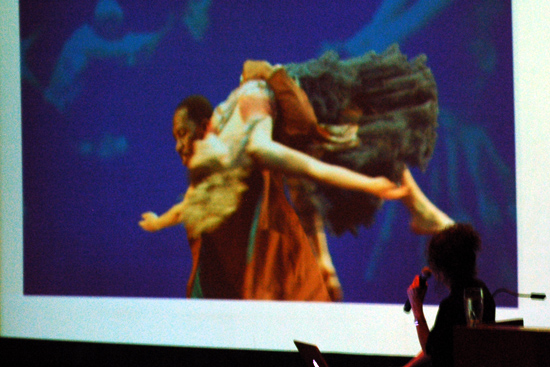“The Making of Ferocious Beauty: Genome” Kicks off Dance Residency at the CFA
 |
| Liz Lerman of the Liz Lerman Dance Exchange, discusses “The Making of Ferocious Beauty: Genome, the first in a series of lectures addressing the implications of genetic research. (Photo by Lex Leifheit) |
| Posted 10/01/05 |
| The year 2003 marked a major milestone in human genomics: the completion of the sequencing of the human genome. With that milestone came a seemingly endless number of possibilities, and the challenge of understanding their consequences.
Where do we as individuals and where do we as a society draw the line, and who should do the line drawing? asked Kathy Hudson, director of the Genetics and Public Policy Center at the Johns Hopkins University, addressing an audience of 120 students, Wesleyan faculty and greater Middletown community members in the CFA Cinema on Sept. 20. Hudson, joined by Founding Artistic Director Liz Lerman of the Liz Lerman Dance Exchange and Associate Professor of Philosophy Lori Gruen, launched a discussion titled The Making of Ferocious Beauty: Genome, the first in a series of lectures addressing the implications of genetic research as part of the Dance Exchanges year-long residency at Wesleyan. For the past three years, the Center for the Arts and Wesleyan Faculty have partnered with Lerman to plan the most comprehensive residency ever undertaken by a dance company at Wesleyan. This partnership has resulted in Wesleyan serving as lead commissioner of Genome, which will premiere at the CFA on Feb. 3, 2006. Theres a long list of partners to thank, CFA Director Pamela Tatge commented as she individually acknowledged the people and organizations who have supported the Genome residency. Hudson also acknowledged a vast number of people, those who contributed to the gene sequencing project as it ramped up in the late 90s, describing the genome itself as three billion chemical letters. Working off a display of images ranging from a fertilized egg being sampled, to a comic strip, Hudson raised questions about the implications for medicine (illnesses detected early, prescriptions based on genetic makeup), equality (out of three billion, only three million chemical letters differ from person to person), justice (corporations blaming bad genes for afflictions such as carpal tunnel syndrome) and reproduction. Liz Lerman opened her part of the dialogue by stating the advantage of artists in exploring the nature of scientific advances. We get to expand the nature of what might be real or not real, true or not true, Lerman said. She added that working on Ferocious Beauty: Genome has been a process of building trust with scientists, learning from them and finding ways in which they can exchange ideas. Audience questions focused mainly on aspects of genetic research they would like to see explored through dance. Lerman did not go into great detail about the premiere, reminding them that the show is still in development, but described her vision of the structure in two parts. Act one will depict ways to understand the science. Act two will explore topics such as identity and ancestry, aging and death, and the quest for genetic perfection as it relates to research funding and profit motives. The premiere of Ferocious Beauty: Genome will be on Feb. 3 and 4, 2006. Tickets are available now by calling the University Box Office at 860-685-3355. Free Genome-related events include Challenging Nature: Biotechnology in a Spiritual World, a lecture by Lee M. Silver, professor of Molecular Biology and Public Affairs at Princeton University at 8 p.m. Oct. 11 in the CFA Cinema, and The Double Helix: Law and Science Co-constructing Race, a talk by Pilar Ossorio, assistant professor of Law and Bioethics at the University of Wisconsin at 8 p.m. Nov. 10 in the CFA Cinema. |
| By Lex Leifheit, press and marketing coordinator for the Center for the Arts |

